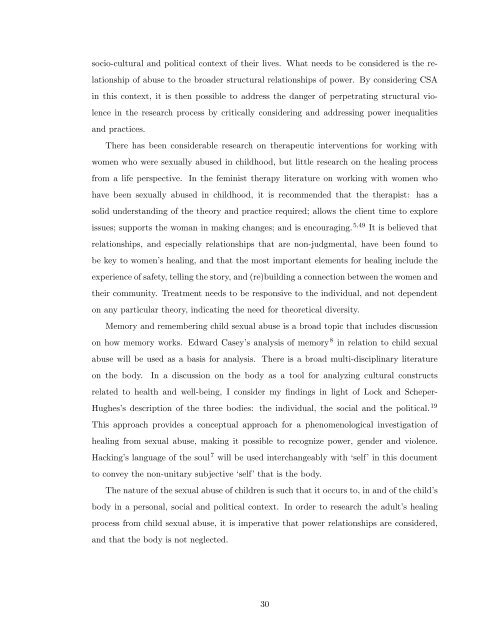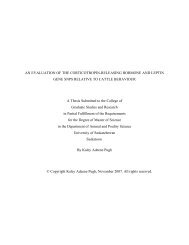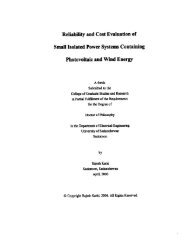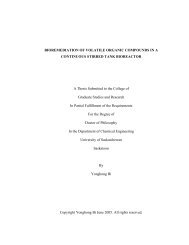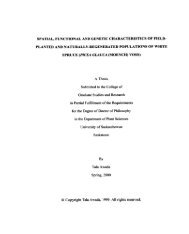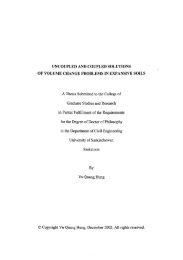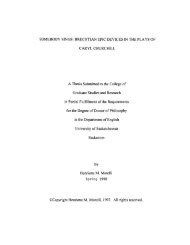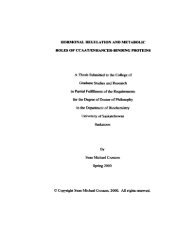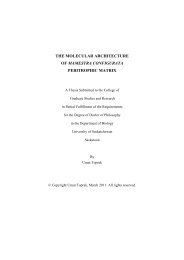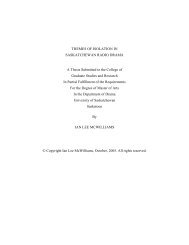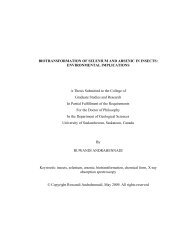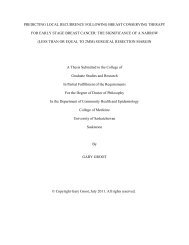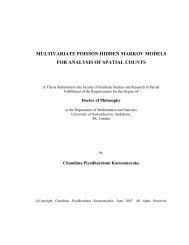Women's Narratives of Healing from the Effects of Child Sexual Abuse
Women's Narratives of Healing from the Effects of Child Sexual Abuse
Women's Narratives of Healing from the Effects of Child Sexual Abuse
You also want an ePaper? Increase the reach of your titles
YUMPU automatically turns print PDFs into web optimized ePapers that Google loves.
socio-cultural and political context <strong>of</strong> <strong>the</strong>ir lives. What needs to be considered is <strong>the</strong> relationship<br />
<strong>of</strong> abuse to <strong>the</strong> broader structural relationships <strong>of</strong> power. By considering CSA<br />
in this context, it is <strong>the</strong>n possible to address <strong>the</strong> danger <strong>of</strong> perpetrating structural violence<br />
in <strong>the</strong> research process by critically considering and addressing power inequalities<br />
and practices.<br />
There has been considerable research on <strong>the</strong>rapeutic interventions for working with<br />
women who were sexually abused in childhood, but little research on <strong>the</strong> healing process<br />
<strong>from</strong> a life perspective. In <strong>the</strong> feminist <strong>the</strong>rapy literature on working with women who<br />
have been sexually abused in childhood, it is recommended that <strong>the</strong> <strong>the</strong>rapist: has a<br />
solid understanding <strong>of</strong> <strong>the</strong> <strong>the</strong>ory and practice required; allows <strong>the</strong> client time to explore<br />
issues; supports <strong>the</strong> woman in making changes; and is encouraging. 5,49 It is believed that<br />
relationships, and especially relationships that are non-judgmental, have been found to<br />
be key to women’s healing, and that <strong>the</strong> most important elements for healing include <strong>the</strong><br />
experience <strong>of</strong> safety, telling <strong>the</strong> story, and (re)building a connection between <strong>the</strong> women and<br />
<strong>the</strong>ir community. Treatment needs to be responsive to <strong>the</strong> individual, and not dependent<br />
on any particular <strong>the</strong>ory, indicating <strong>the</strong> need for <strong>the</strong>oretical diversity.<br />
Memory and remembering child sexual abuse is a broad topic that includes discussion<br />
on how memory works. Edward Casey’s analysis <strong>of</strong> memory 8 in relation to child sexual<br />
abuse will be used as a basis for analysis. There is a broad multi-disciplinary literature<br />
on <strong>the</strong> body. In a discussion on <strong>the</strong> body as a tool for analyzing cultural constructs<br />
related to health and well-being, I consider my findings in light <strong>of</strong> Lock and Scheper-<br />
Hughes’s description <strong>of</strong> <strong>the</strong> three bodies: <strong>the</strong> individual, <strong>the</strong> social and <strong>the</strong> political. 19<br />
This approach provides a conceptual approach for a phenomenological investigation <strong>of</strong><br />
healing <strong>from</strong> sexual abuse, making it possible to recognize power, gender and violence.<br />
Hacking’s language <strong>of</strong> <strong>the</strong> soul 7 will be used interchangeably with ‘self’ in this document<br />
to convey <strong>the</strong> non-unitary subjective ‘self’ that is <strong>the</strong> body.<br />
The nature <strong>of</strong> <strong>the</strong> sexual abuse <strong>of</strong> children is such that it occurs to, in and <strong>of</strong> <strong>the</strong> child’s<br />
body in a personal, social and political context. In order to research <strong>the</strong> adult’s healing<br />
process <strong>from</strong> child sexual abuse, it is imperative that power relationships are considered,<br />
and that <strong>the</strong> body is not neglected.<br />
30


